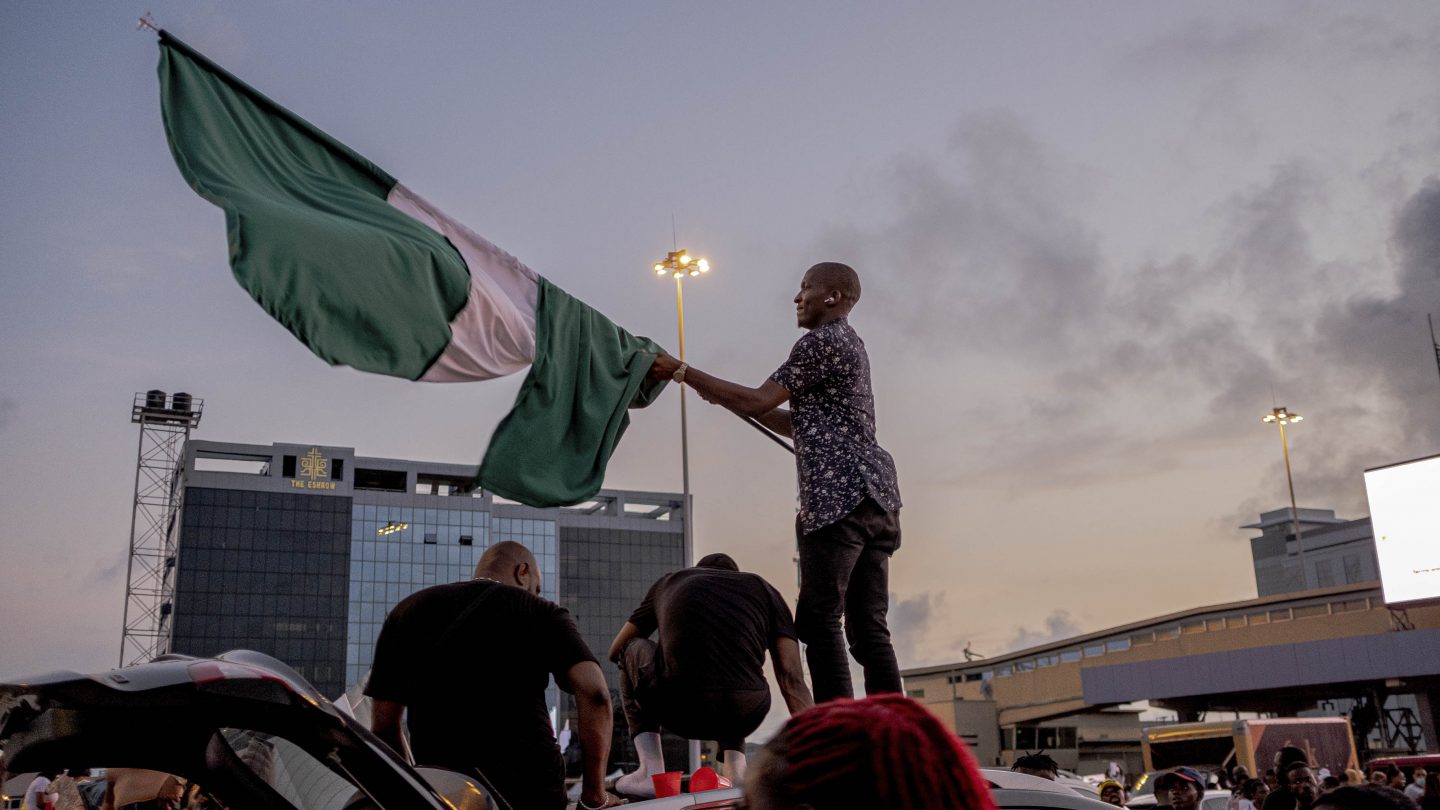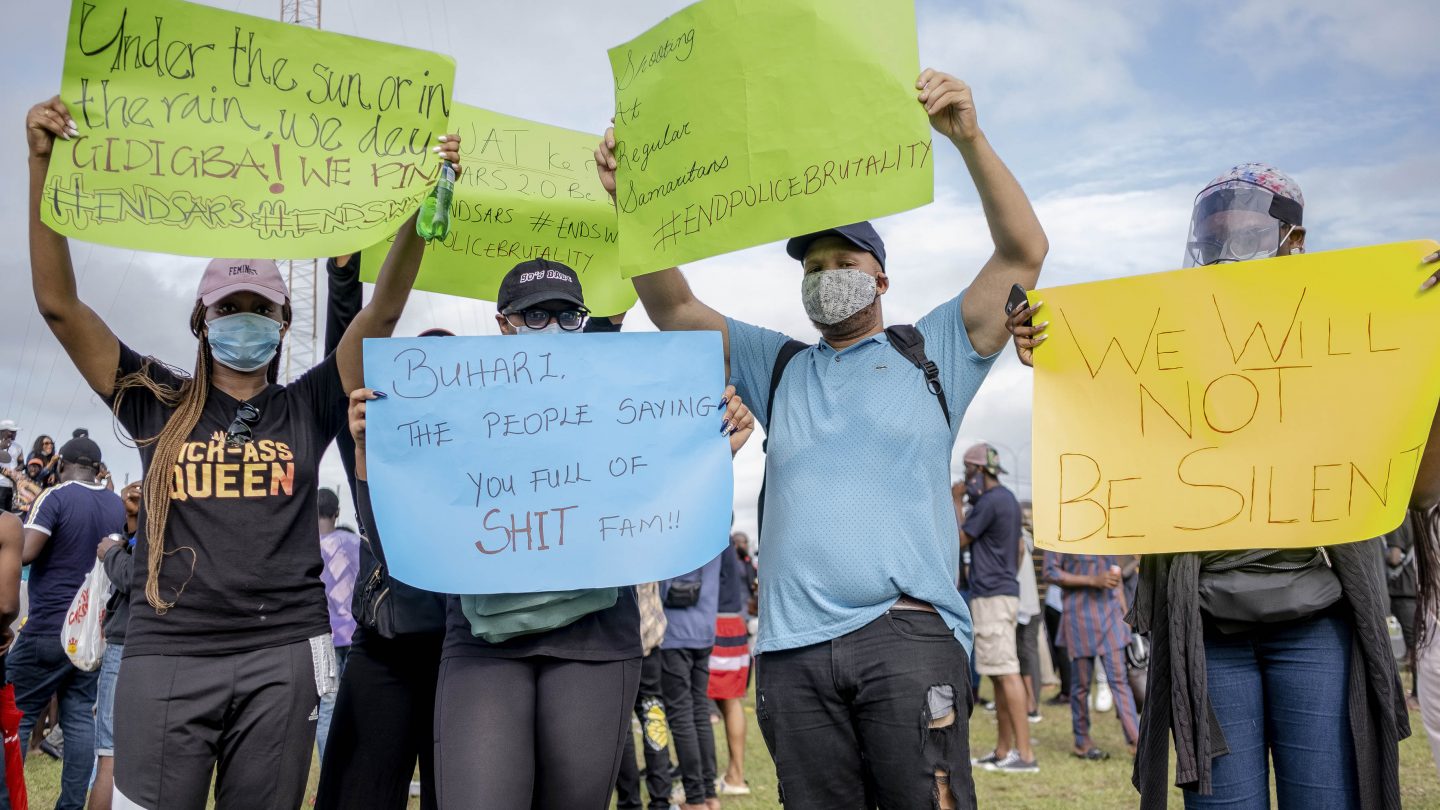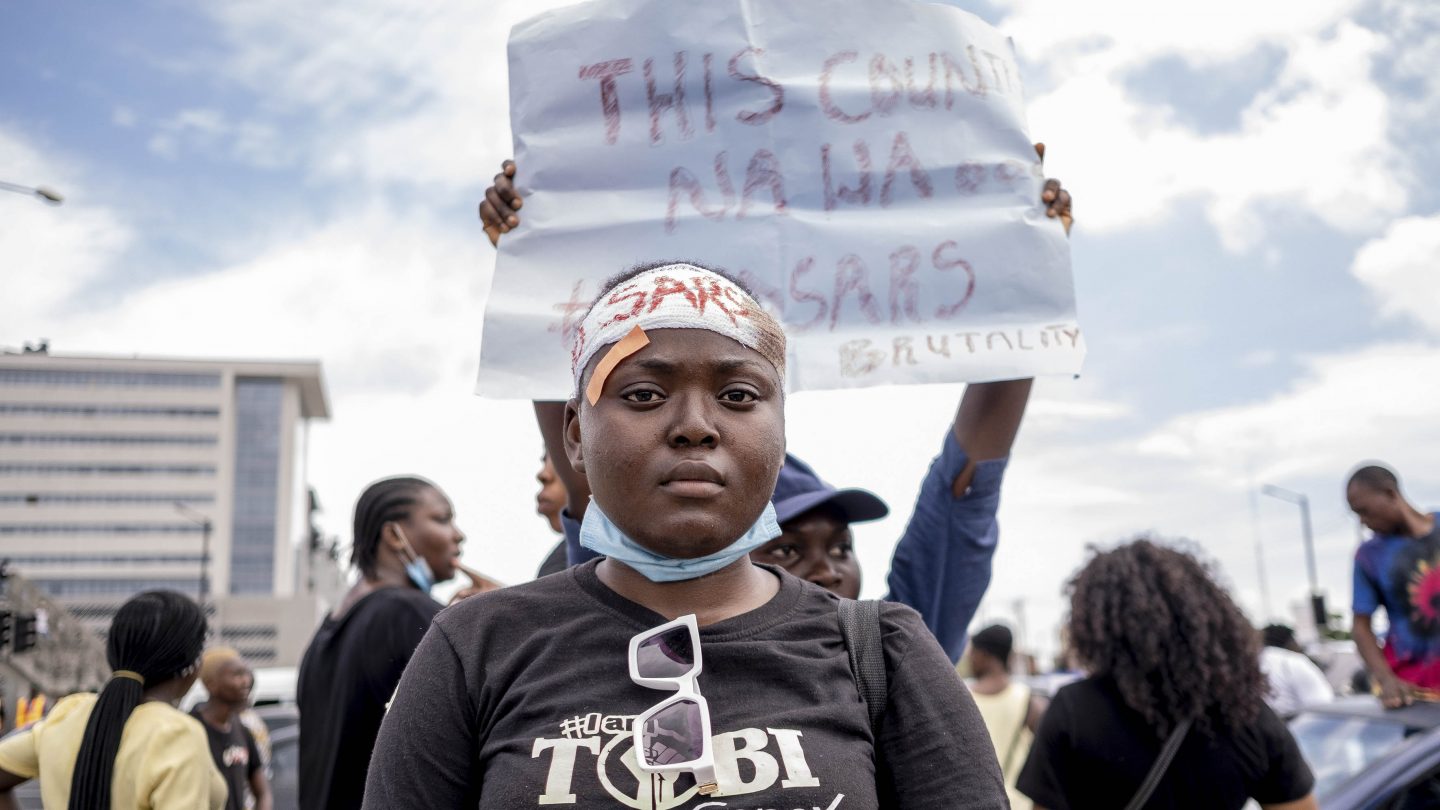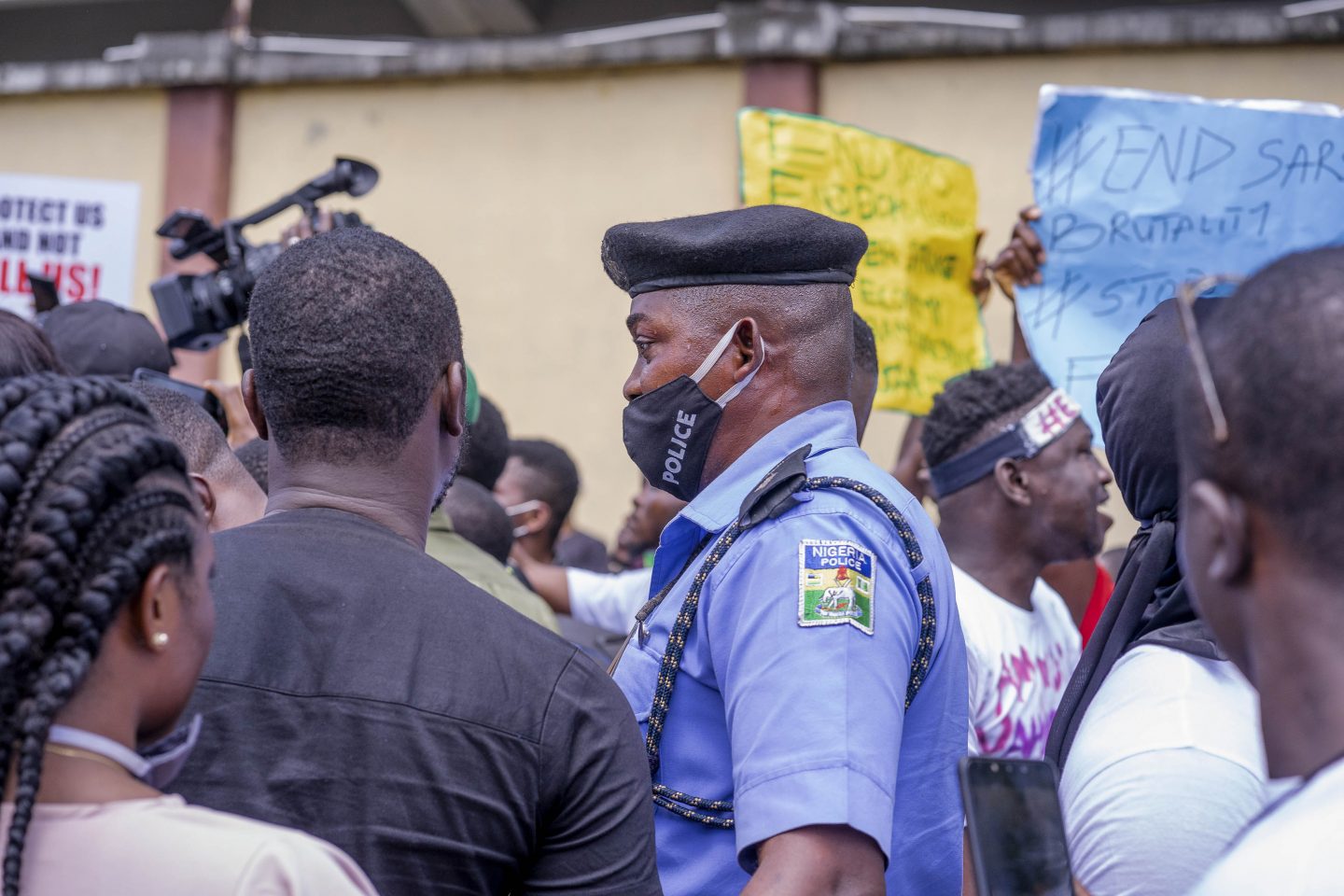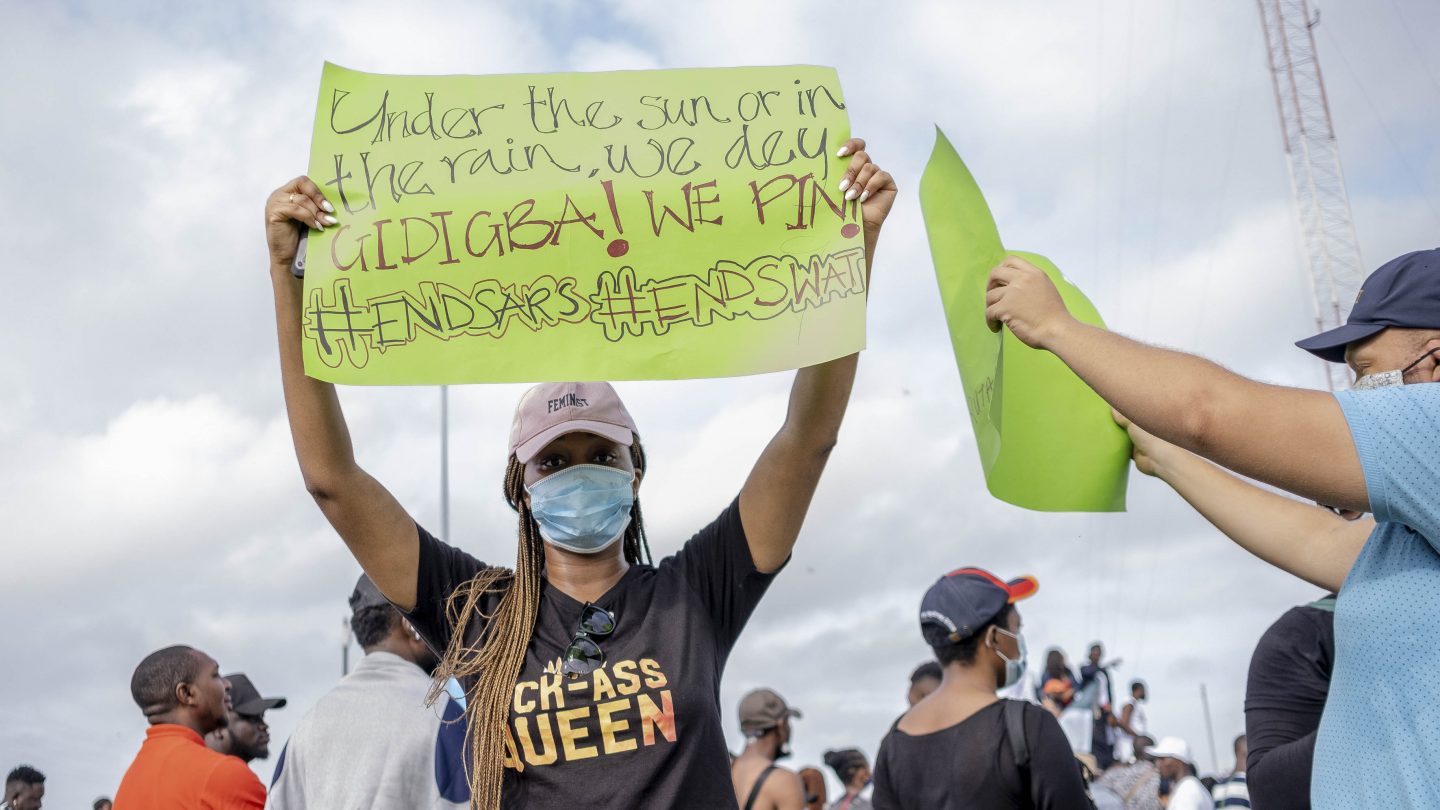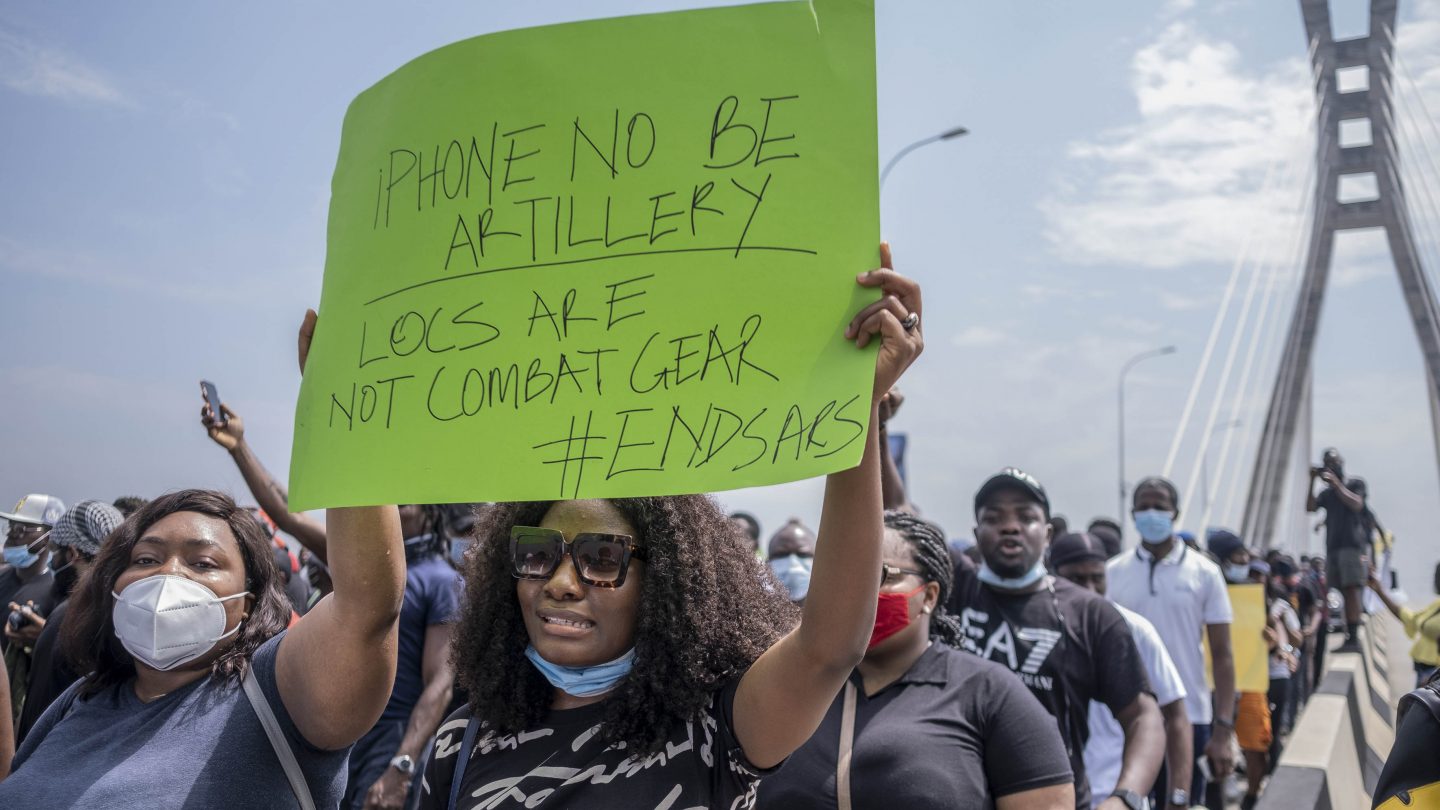Violence continues in Nigeria despite SARS disbanding
The Special Anti-Robbery Squad may have been dissolved, but law enforcement violence continues. Soldiers have killed protesters in Lekki for defying the Lagos state’s curfew.
Author:
21 October 2020
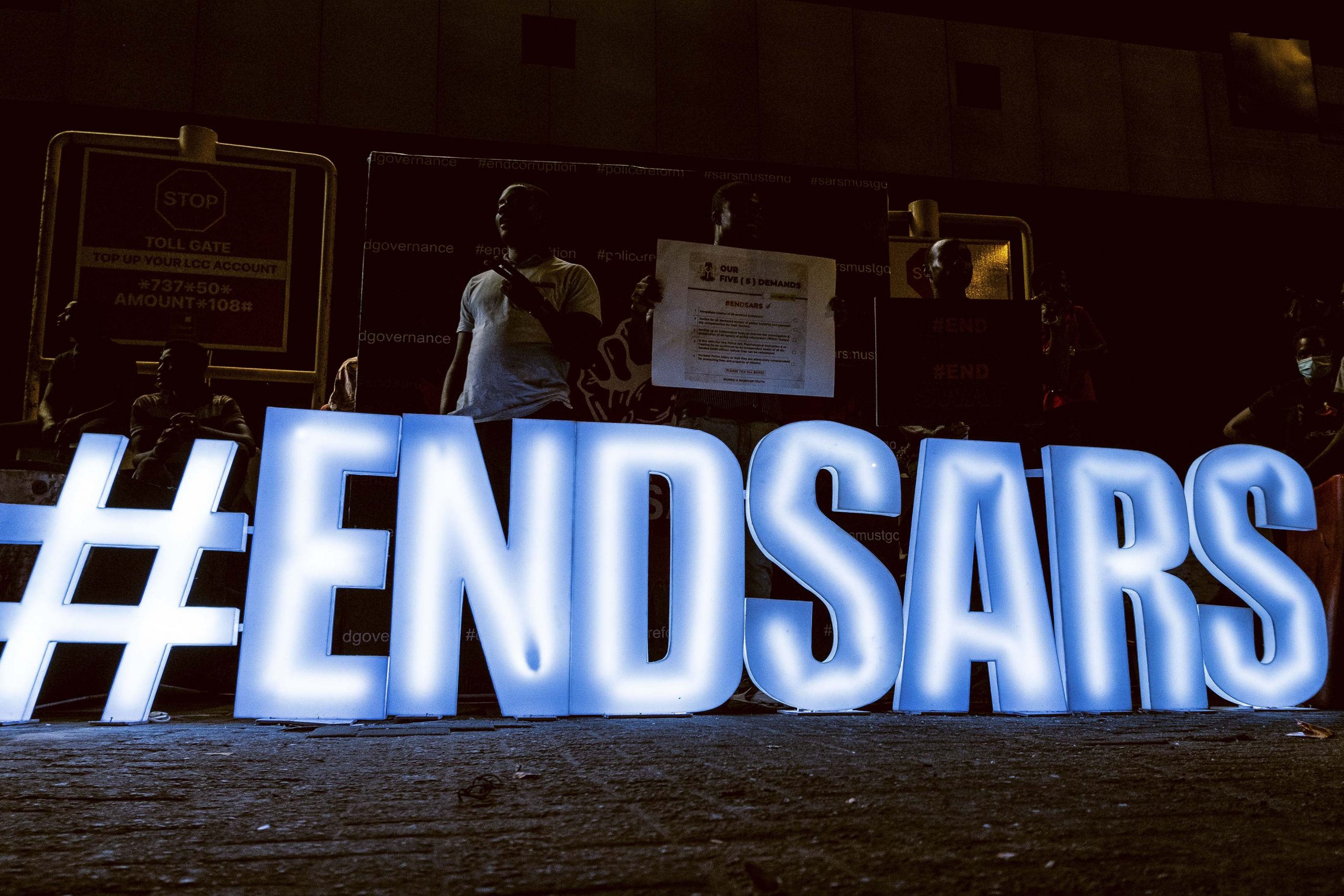
Timiebi Ebitibituwa, 33, was one of the thousands of protesters who poured on to the streets in different states across Nigeria to protest against the Special Anti-Robbery Squad (SARS), a dreaded unit of the Nigerian police.
On the morning of 11 October 2020, she was heading for the police headquarters in Abuja, the country’s capital, with other protesters. Ebitibituwa is new to the city and barely knows her way around, but, like other young people, she felt she had to show her anger at the police unit with a reputation for extrajudicial killing, torture, extortion and harassment.
The protest, which had been peaceful since it started in the capital on 7 October, turned violent that morning when police shot at protesters and deployed water cannons and teargas to disperse them.
“It started just about 11am when they started spraying us [with] water and then tear gas canisters,” Ebitibituwa said. “We ran but I stopped and went back as people were still holding the front line.
Related article:
“The attacks on the protesters continued but no one was recording, so I turned on my camera and started recording. I got exhausted and could no longer breathe properly, so I said to myself, the last [thing] they would do is arrest [people], and I stopped running. I was wrong,” Ebitibituwa said. “I looked across the road and saw that they were hitting two girls with big sticks.”
The police officers soon got to Ebitibituwa and attacked her, leaving her with swollen hands, sprained wrists and bruised legs and shoulders. “The police officers beat me until a baton broke on my body. One of them said, ‘[I’m going to] waste you, throw your body [in the] gutter, nothing [is going to] happen [to me].’”

The police squad
In 1992, the anti-robbery squad was formed within the Nigerian police force to focus on cases of armed robbery. The SARS’ brief was simple: rid the country of armed robbery and kidnapping. They went about it covertly, shadowing their targets and taking them down with AK-47s and other high-powered weaponry. This was done with little or no disciplinary oversight.
The squad’s target changed with the rise of cybercrime, which was used as an excuse to operate on the streets, harassing, extorting and committing crimes against often innocent citizens. The squad began to focus on young people using various profiling techniques to single out so-called likely criminals. The officers looked for young men who used gadgets such as iPhones and laptops, drove cars or sported tattoos, labelling them cyber criminals. Young women were profiled as sex workers for wearing what officers described as “expensive clothes”. Also, armed with Nigeria’s homophobic laws such as the Same Sex Marriage Prohibition Act, officers targeted queer people. As a result, the squad has been involved in innumerable crimes, including murder.
According to a 2020 Amnesty International report, there have been at least 82 cases of torture and ill treatment by the SARS between May 2017 and June 2020. This report comes after a 2016 one detailed how officers routinely torture people, but the Nigerian government was yet to reform the unit.
Early in October 2020, SARS operatives allegedly threw Joshua Ambrose out of a moving car in Ughelli, a town in Delta State. Footage of the scene made it to social media.
The video enraged viewers and the hashtag #EndSARS started trending again with an explosion of people’s experiences flooding the internet. The names of people killed by the SARS in the past few years – including Tina Ekweze, Daniel Abugu and Tiamiyu Kazeem – started once again circulating. Eventually, protests broke out.

The protests
Esanwa, a Nigerian footballer who only gave his first name, has attended protests at different locations in Lagos. When approached at one at the House of Assembly in Ikeja, Lagos, he was visibly agitated, waving his placard in the air.
“I am angry,’’ he said. “They almost hacked me with an axe, these SARS officers.” The incident, he said, happened in July at Ikorodu in Lagos. “Imagine a police officer with an axe,” he screamed angrily as he hopped alongside other protesters.
“I only wanted to buy fuel. I was only wearing a top, shorts and a canvas. Can’t I dress well?” he asked. “I had no other option than to comply with them. One of them already [cocked] his gun. They checked my phone and found nothing incriminating, but they continued harassing me.”
Eniola Daniel, a media practitioner, interrupted: “It is not only SARS [that is the issue]. We have impunity in the government,” he said. “The government should hear our voice.”
Thousands streamed by, their fists raised above their heads in defiance, chanting “end SARS”.
“Imagine my mum at home thinking I was merely going to buy fuel hearing I was already dead,” Esanwa said above the din.
Solidarity protests have been organised by Nigerian diasporas in the United States, England and Germany, among others, and support has been pouring in from celebrities and influential figures including Kanye West, John Boyega and Twitter chief executive Jack Dorsey. The hashtag #EndSARS now has a brand logo on Twitter, just like #BlackLivesMatter.
Little recourse
Changes to the squad have been promised since 2017. In 2018 and 2019, Yemi Osinbajo – as acting president – and Inspector General of Police Mohammed Adamu announced reforms, but none were implemented. On 10 October this year, Adamu announced the “dissolution” of the controversial unit to usher in the Special Weapons and Tactics Team.
Part of the recent reforms announced by the police would be the transfer of defunct SARS officers into other units. But protesters continue to clamour for the total removal of the officers from the police force.
Idowu Awopeju, a lawyer based in Lagos, has experience dealing with the SARS after representing a number of detainees in its custody. The lawyer is mostly forced to negotiate with SARS officers rather than going the legal route, with the operatives demanding bribes in the guise of bail.

“They are not even interested in taking you to court, no matter how grievous your offence is. Their definition of justice is how much … is on the table for them,” Awopeju said.
Awopeju employs diplomatic means in dealing with SARS officers. “I more or less ingratiate myself with them because, with the exception of a few, I know I am dealing with privileged illiterates,” he said.
Volunteers keep the protest alive
Totally unprecedented in Nigeria’s protest history, the recent wave of demonstrations has been sustained purely by citizens through donations and volunteering.
Despite the repression by the police force, which has seen at least 10 people killed in Lagos, Oyo and Abuja, volunteers have made sure the protests keep going with the provision of meals, water, medical aid, legal representation and trauma counselling for arrested protesters.
GirlHub Africa, an all-women volunteer collective, helps control traffic and picks up litter at the protest grounds.
“We knew there would be traffic congestion when a large crowd turns out to exercise their right, so we decided to come and volunteer,” Gusy Tobby, the president of the volunteer group, said.
The Feminist Coalition is a community of Nigerian women who use social media for justice. Through crowdfunding they have raised over 70 million naira and more funds in other currencies to help organisers provide medicine, legal aid, food, drinks and security at the protests. They also volunteer at a hotline to cater to protesters’ needs.
‘So much pain’
Ebitibituwa recounted her ordeal at the hands of police officers. She said they punched and pepper sprayed her. Her phone was seized and smashed as she pleaded to be spared.
“I heard him say, ‘What has SARS done to you? Why are you protesting? You want to end SARS, why?’ They claimed I was a prostitute [who had] been paid to come and protest.
Related article:
“A security man in a nearby building helped me and another girl. When I was inside, I forgot all the advice I got before the protest and poured water on my face. It burned more, and I was in so much pain.”
On the evening of Saturday 17 October, a candlelight vigil was held at protest centres across the country in honour of the victims of police brutality. Participants shared their harrowing experiences of violence.
The next day, the Presidential Panel on Reform of SARS announced that it recommended firing 37 former members of the now-defunct SARS, with 24 tipped for prosecution following 113 complaints on alleged human rights violations logged at the panel.

Despite these announcements, more protesters continue to spill on to the streets, wanting to see action beyond announcements. But they have faced more brutality, with the army and police officers violently dispersing peaceful protests.
On Monday 19 October, in Edo State, there was a massive jailbreak at the Nigerian Correctional Service with inmates being freed, which has led to the announcement of a curfew in the state.
Last night, on Tuesday 20 October, soldiers shot at protesters who were out in Lagos in defiance of the curfew order. The British Broadcasting Corporation reported that a witness had counted about 20 bodies and at least 50 injured people after soldiers opened fire.


